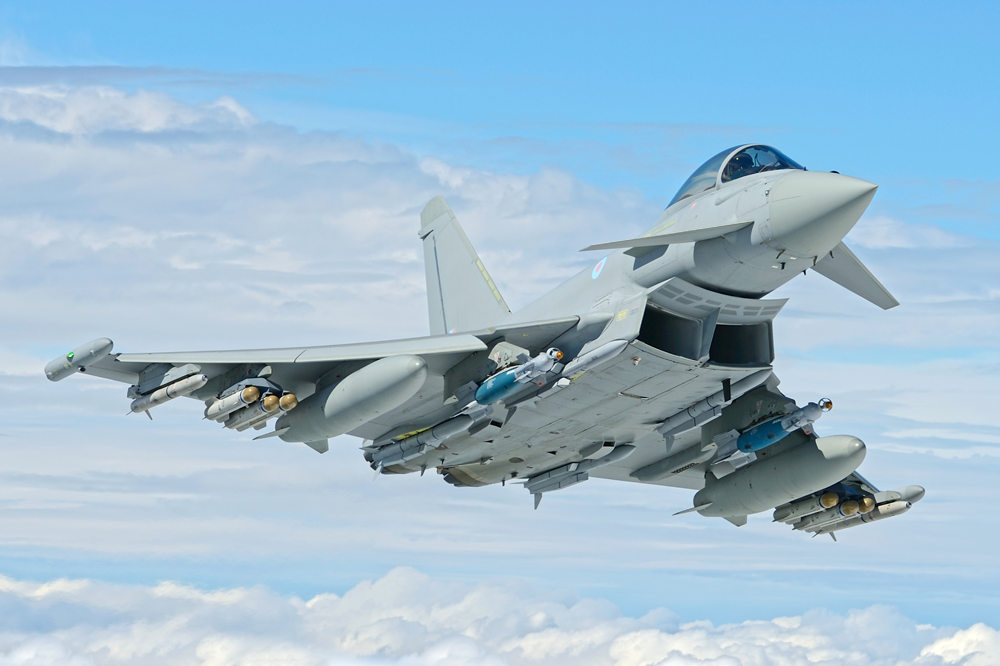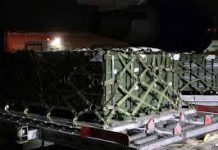
The general consensus is that Turkey is keen on acquiring 40 Eurofighter Typhoons, as they anticipate the US may not provide them with an equivalent number of F-16 Block-70s. This anticipation stems from Turkey’s association with Hamas, a known terrorist group, and their pressing requirement to modernize their Air Force’s fleet of outdated fighter aircraft.
However, President Erdogan faces a hurdle in procuring the Eurofighter Typhoon. Garnering backing from Germany and Chancellor Solz has been a tough task.
Intriguingly, German unions have become an unexpected ally in Turkey’s pursuit. They are supporting Turkey’s effort to acquire the Eurofighter, motivated by fears of potential job losses if contracts for the aircraft are not secured and fulfilled.
The production of the Eurofighter Typhoon aircraft involves a consortium from Germany, Great Britain, Italy, and Spain, represented by Airbus, BAE Systems, and Leonardo.
Turkey’s Defense Minister, Yasar Guler, has expressed his ongoing discussions with Britain and Spain for the procurement of Typhoons. However, Germany remains opposed to the idea.
In a recent meeting on Thursday, Mr. Guler conversed with his British counterpart, Grand Sappé, in Ankara. They share a common aspiration of persuading Germany to reconsider their request, which currently obstructs a potential deal to sell another batch of aircraft to Saudi Arabia.
“Necessary adjustments must be made soon to ensure our positions are future-ready. This necessitates dependable planning, especially in the military sector, concerning the future of the Eurofighter. Starting a contract for its further development before this period ends is essential,” said a spokerman for MTU Aero Engines
“The conclusion of the Eurofighter program is set to cause considerable layoffs among the European high-tech supplier community in a matter of years. It’s crucial to preserve these skilled workers and production assets, with an eye towards the future European FCAS [Future Combat Air System].”
“The expertise of the engineers dedicated to the Eurofighter’s ongoing enhancement is invaluable. Without appropriate opportunities, these professionals may shift to other sectors. By focusing on sustained development of the Eurofighter, we are laying the groundwork for a robust influence of the German aerospace industry and its suppliers in future European technology initiatives.”
Airbus has expressed its approval for the intention to ink new deals for the sale of Eurofighters originating from Germany. Michael Reich, the political secretary and operating director at Airbus, the producer of Eurofighters, stated that the approval of these contracts was crucial for Germany to affirm its “military autonomy”. He mentioned: “We, at IG Metall, demand that public funds should be accompanied by conditions such as the continuous improvement of the Eurofighter.”
Reich stressed that secure employment and supply chains are vital for achieving independence in military aviation. He openly backed Thomas Pretzl, the Chairman of the Airbus Defense and Space Works Council, in stating that anyone advocating for a new era must support the acquisition of the Eurofighter.
“Unfortunately, the consistency in the actions of politicians is often lacking. However, the fact remains that unless an order is placed now for the continued development and production of more Eurofighters, the next administration will be left with no choice but to purchase American fighters. While this might appear advantageous for Germany, it’s crucial to consider the consequences.” The German aviation industry employs over 25,000 people and includes more than 120 companies.
“The Turkish Question”
Talks have commenced between Turkey and several European countries following Turkey’s admission that its attempt to acquire F-16 fighter jets from the United States might not succeed. This news was revealed by a source within the Turkish defense ministry on Thursday. In October 2021, Turkey had shown interest in buying 40 F-16 fighter jets from Lockheed Martin Corp, along with 79 upgrade kits to enhance their existing fleet of fighter aircraft.
Despite initial indications of approval from US President Joe Biden’s administration for the massive $20 billion deal, a stumbling block has appeared in the form of congressional opposition. This opposition arises in response to Turkey’s reluctance to back Sweden’s NATO membership.
Turkey’s defense ministry issued a statement, signifying Mr Guler’s interest in bolstering partnerships with Britain across various sectors. A primary focus of these collaborations would be Turkey’s national Kaan fighter jet and Eurofighter Typhoon fighters. The delivery of aircraft was also discussed during the meeting. This was highlighted by Mr Shapps’ report on the proceedings.
Defense analyst Tayfun Özberk provides his perspective, “It’s no secret that Turkey is in the market for a technologically superior warplane, particularly when taking into account regional power balances. The push to secure Eurofighters could be a strategic maneuver to pressure the Biden administration and urge Congress to greenlight the sale of F-16s.”
Serhat Guvenc, a Professor of International Relations at Kadir Has University in Istanbul, proposes, “The Typhoons could be Turkey’s last chance to maintain a presence in the Western defense industry.”
He adds, “The transition to Eurofighters might cause some operational glitches, given that the Turkish Air Force operates on an American-inspired system. However, since the Eurofighter is a joint project of NATO members, issues with interoperability are unlikely.”
Last week, Turkish President Recep Tayyip Erdogan underscored his willingness to explore other options if German Chancellor Olaf Scholz objects. “We have various sources to procure fighter jets,” Erdogan announced.
Interestingly, Turkey isn’t the only country facing this dilemma. Germany has also put a long-standing order from Saudi Arabia on hold.
Saudi Arabia’s intention to purchase 48 Eurofighter Typhoon fighters is experiencing delays due to Germany’s intricate coalition politics, affecting the confirmation of a delivery date. This delay could cost German defense companies a substantial amount of approximately 2.3 billion euros [$2.51 billion] in revenue by 2026.




